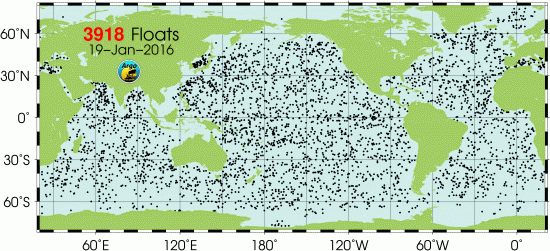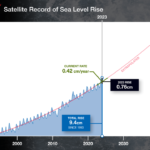January 19, 2016 – Since the 1970s the oceans of the world have been the principal repository for both carbon dioxide and global warming. What started off as surface heating has now penetrated to depths of 700 meters (2,300 feet). The side affect of this deep heating is an expanding ocean with higher sea levels and tides that are increasingly becoming flood threats to most coastlines.
Right now 35% of the heat generated by greenhouse gas emissions is going to depths below 700 meters and the distribution of a global ocean-wide network, the Argo Programme, consisting of 3,918 floating sensors (see map below), is giving us the best picture we have ever had of the impact on the planet.
In a paper entitled, Industrial-era global ocean heat uptake doubles in recent decades, researchers from Lawrence Livermore National Laboratory, Princeton University, Penn State and the NOAA Pacific Marine Environmental Laboratory, studied the data from a fleet of surface and deep ocean sensors gathering temperature, salinity and acidification measures. Some of the sensors reached depths of over 6,000 meters (20,000 feet). In their observations they note that although the actual temperature rise globally is small, the capacity of the ocean to absorb heat, is “huge” as our friend Donald Trump would say.
The graph appearing below indicates just how much warming has occurred. From the network of smart buoys we can trace a doubling in ocean heat uptake since 1997. The current El Nino is part of the phenomenon as the ocean exhibits spikes in its warming rate. It makes me wonder what the Donald would think about his climate change position if he were to study the results of this paper? Could he continue to deny what scientists in his own country and the Argo technology, also a product of the United States, is showing?
Observes John Shepherd, Earth System Scientist at the National Oceanography Centre, University of Southampton, in the United Kingdom, “once the ocean heat uptake settles down again, the rate of warming is likely to return to what it was before.” That rate of warming he is referring to is the once that appeared to hit a lull in rising atmospheric temperatures observed in recent years. But in fact the lull has largely been discounted in further research. Shepherd, however, makes a more poignant argument when he states, “the extra heat will either remain in the ocean, where it may affect both ocean and atmospheric circulation patterns, and so contribute to unusual weather patterns like El Nino, or it may be released to contribute to more rapid or prolonged warming later on. It’s certainly not a cure for climate change.” His conclusion, if it hasn’t escaped notice, is that the ocean is a finite carbon heat sink. At some point there will be consequences.
The most disturbing observation from this journal paper is the data that shows warming in deeper layers of the ocean. Our human generated greenhouse gases are no longer an atmospheric and ocean surface phenomenon. We are now driving heat deep into the abyss.
At COP21 the 190 plus countries on the globe pledged to establish targets to begin lowering carbon emissions starting in 2021. That is all well and good. But what it doesn’t stop is latent heating from existing atmospheric greenhouse gases which the ocean is continuing to absorb. The impact on ocean biodiversity is as of yet not fully understood. Yes we are seeing coral bleaching and species decline. But how many will fail to adapt to the rising water temperatures we have created? How much of the Earth’s marine life will we lose before we can reverse the process?



















